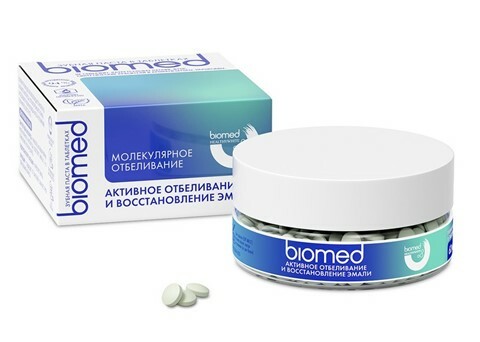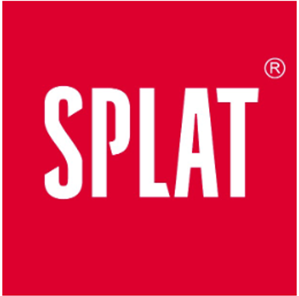



Keep this story going! Share below!
SPLAT Global, a leading Russian oral care company, is pioneering new product formats to reduce packaging waste. Their innovation, BIOMED toothpaste tablets packaged in recyclable glass jars, offers an effective alternative to traditional toothpaste tubes. In addition to this, the toothpaste was developed by students, who later joined the company as a separate business unit. This shows how company foster innovations and supports young talents. Overall, innovation addresses four UN SDGs:
The innovation is a fundamental shift in the form and packaging of toothpaste. It is a solid, dry-format toothpaste tablet that consumers chew before brushing, replacing the traditional paste contained in a tube. While the cosmetic tablet format itself is not new, BIOMED's patented innovation is the inclusion of piezoelectrics within the tablet composition. The key feature of this innovation is the dry format itself, which eliminates the need for a high-barrier, multi-laminated plastic and aluminum tube – the industry standard for preserving product quality. Instead, the tablets are housed in a simple, fully recyclable glass jar with a lid.
This innovation emerged from years of experimentation within SPLAT, driven by the technical challenge of finding recyclable packaging for active oral care products. It was part of a broader company-wide effort that included other projects like refill stations and new tube materials. The creation of this specific product was suggested by a team of young innovators in a form of start-up, under the BIOMED brand. As Svetlana Kopytina, Head of Environmental & International Contract Manufacturing at SPLAT Global, explained: "This solution was developed by participants from the 'Act Like an Owner' course [MSU Graduate School of Business course]. They came to our company as interns after the course, stayed, and launched this product." These interns joined SPLAT Global in as a separate BIOMED business unit and were supported by company's experienced R&D and sustainability teams. They were key players in bringing the concept to life. Anastasiia Nidziy, Brand Director of BIOMED, author of educational projects for young talents from SPLAT Global, commented about the course and its value in her interview for RBC: “Our shared goal wasn't just to hold master classes, but to guide the students through the full product creation cycle, leveraging the company's accumulated experience: from "what if?" to "look—there it is on the shelf!" And the main result of this undertaking wasn't just credits on a report card, but a real product born from the course that's already being sold”.
This innovation is deeply connected to SPLAT's sense of purpose and BIOMED’s brand identity. The recyclable jar and a new type of toothpaste represent the company's purpose to reduce its environmental footprint through systematic, operational changes, not just philanthropy. It represents a practical application of their commitment to overcoming technical and economic barriers to make sustainable choices a viable business reality.
Svetlana Kopytina emphasized: "We made a product in such packaging, but now it’s not a paste - it's tablets. The question is how ready buyers will be to sacrifice convenience and use hard tablets, even if the container can definitely be sent for recycling. We are watching with interest how the brand will promote this product, and we will see if it manages to change consumer behavior."

The original idea was born from a persistent and recognized problem within the oral care industry: the environmental dead-end of toothpaste packaging. For years, SPLAT, and specifically BIOMED, was acutely aware that their most effective products, which require protection from oxygen and moisture to maintain their active ingredients, were dependent on non-recyclable, multi-laminated tubes. As Svetlana noted: "Such tubes are not recyclable because the mixture of polyethylene and aluminum is not in demand." This created a constant tension between product efficacy and environmental responsibility.
The motivation for the new product had two reasons. First, it was a direct response to the growing global waste crisis and the lack of recycling infrastructure for complex packaging. Second, it was driven by an internal desire to align the company's operations with its values. The journey was not straightforward; earlier attempts to implement more sustainable technologies were often cost-prohibitive. The motivation persisted, however, leading to continued research and partnerships – with young students, who were able to bring this innovation to the company – that eventually made this innovation economically feasible.
Svetlana Kopytina explained: "It is a toothpaste, but now it is in glass packaging. Glass is the ideal material; it recycles very well. The challenge is that recycling it can be expensive. But on the other hand, it recycles perfectly, much like aluminium."
And since SPLAT Global already had BIOMED, which brand identity was built on innovations and sustainability – the new product was launched under this name.
Impact on the Business: The introduction of toothpaste tablets has allowed SPLAT to diversify its product portfolio and enter the growing market for solid cosmetics. It strengthens the positioning of its BIOMED brand as a leader in innovation and natural, conscious products. This move also proactively addresses future regulatory risks, as governments increasingly implement Extended Producer Responsibility (EPR) schemes that impose higher eco-taxes on non-recyclable packaging. By transitioning to recyclable options, SPLAT is future-proofing its operations against these potential risks and costs.
Impact on Society: The product serves as an educational tool, physically demonstrating to consumers that daily routines can be reimagined for sustainability. It sparks conversation about recycling and waste, encouraging a more mindful approach to consumption. While acknowledging the challenge of changing habits, SPLAT is using this product under BIOMED to test and promote a new, low-waste behavior, contributing to a broader cultural and behavioural shift.
Impact on the Environment: The most direct environmental impact is the substitution of non-recyclable packaging with recyclable glass. This action directly reduces the volume of long-lasting packaging waste entering landfills or the natural environment. Furthermore, the dry format can lead to a reduction in the water content of the product, potentially lowering the carbon footprint associated with transportation due to lighter weight.
Short-term and Long-term Effects: In the short term, the effect is the successful launch of a pilot product that tests market acceptance and begins to divert a small stream of waste from landfills. The long-term effect, if scaled, is the establishment of a new, waste-free standard for oral care packaging and the accumulation of significant waste reduction as the product category grows.
Specific Evidence of Impact: The innovation is not an isolated experiment but is integrated in a formal corporate strategy. Svetlana confirmed: "In 2024, we have developed and approved a three-year project plan for the transition to eco-friendly packaging."
Svetlana Kopytina commented on measuring impact: "Our contribution will be small... But still, it is our contribution. We methodically implement the rules for recyclability and watch how the state manages, and we try to help… We can do this through a mechanism called EPR - Extended Producer Responsibility. It means that for each product package, we pay an eco-tax. We have two options: we can pay the state, or we can directly sign a contract with a company that collects and recycles packaging like ours, and it will recycle exactly the amount of bottles we produced on our behalf."
Dry toothpastes are not yet popular on the Russian market, but the younger generation's concern about responsible consumption is rising. The innovation benefits the business by opening a new revenue stream in the cosmetics market. It also strengthens the brand equity as a sustainability leader.
The development of recyclable package and product, which is made for responsible consumption, also ensures regulatory compliance in the face of evolving environmental legislation. Russia’s environmental legislation is still developing, but it is clear that there will be shifts in the future. By introducing responsible products today, SPLAT Global mitigates future risks and costs, which might appear from new regulations.
The innovation fostered the further development of new forms of recyclable packages. Successful launch of sustainable product made the task not just a dream, which employees might not believe or question. It showed that sustainable products is company’s reality, which increased SPLAT Global’s determination to move in this direction in future.
Last but not the least, the process of the toothpaste creation and launch of product, helped company find a new talent from outsource. As Anastasiia Nidziy commented on her interview for RBC: “As the pill case demonstrated, young entrepreneurs and scientists can bring more than just an idea; they can also provide impetus for the development of our own technologies. Research projects help solve specific business problems with minimal investment."
The innovation has immense societal value because it provides a practical and viable alternative for everyday consumption. By minimizing waste and promoting a reusable and recyclable form of packaging, not only does it provide consumers with a tangible way to make more responsible choices, but it also becomes a palpable representation of how small everyday habits can lead to global sustainability. The introduction of such a product works to generate long-term awareness in the minds of consumers, making them reassess their habits and opt for products that minimize environmental impact. In this regard, the project also works as an educational and behavioral tool, encouraging people to adopt more aware and eco-friendly lifestyles.
One of the main social aspects of this innovation is that it was created with the active involvement of young SPLAT experts. That they were engaged speaks volumes about the open and progressive character of the company's innovation management, where employees' creative potential is encouraged and directed toward pertinent environmental goals. Such collaboration is an example that sustainability can be achieved not only through technology but also through the collaboration of people and social engagement.
The innovation similarly has a measurable effect on the environment. It replaces traditional non-recyclable toothpaste tubes with fully recyclable glass packaging, which reduces waste levels and pollution caused by plastic packaging instantly. The substitution promotes the achievement of a circular economy, in which materials are recycled instead of being wasted. Aside from this, SPLAT adheres to strict environmental regulations and industry standards in product development so that every stage—from product design to production—is aligned with eco-principles. Thus, the company's toothpaste in a jar not only passes the requirements of the environmental movement but actually helps decrease the overall amount of non-recyclable packaging in the oral care sector.
Get stories of positive business innovations from around the world delivered right to your inbox.
Svetlana Kopytina, Head of Environmental & International Contract Manufacturing

SPLAT Global is a major developer and manufacturer of oral hygiene products in Russia, operating two of its own factories. The company produces over 15 million product units monthly and holds a significant market share. SPLAT has a long-standing commitment to sustainability, with dedicated leadership overseeing its environmental strategy and a focus on integrating eco-innovations into its core business operations, from production to packaging.